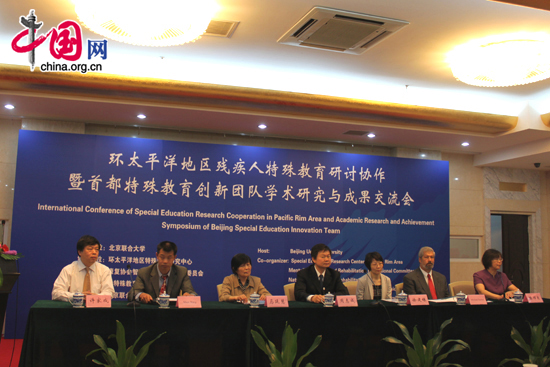China, US good partners in special education
Researchers from America and China expressed enthusiasm for collaboration in special education when they met at the International Conference of Special Education Research Cooperation in the Pacific Rim in Beijing from May 27 to May 29.
|
The International Conference of Special Education Research Cooperation in the Pacific Rim attracts researchers from America, Australia, New Zealand, Thailand, Hong Kong, China, as well as 300 staff members from special-needs schools, government agencies and NGOs in Beijing. [China.org.cn] |
Special education is a greater challenge for developing countries, according to Professor Chris Forlin from the Hong Kong Institute of Education, who delivered the keynote speech in which she cited an estimated 150 million children with disabilities in the world — nearly four-fifths in developing countries.
Mian Wang, associate professor of special education at Gevirtz Graduate School of Education, University of California, noted the significant head start some countries have had for special education.
"For many developed countries, they have a national policy which mandates certain education rights and services to kids with disabilities," Wang said, "For America, it took three to four decades to start and get to this point. They had the first special education law in 1975. One cannot deny students' access to a school. But in China special education is still in its infancy, and there is a long way to go."
Wang emphasized how collaborative research will eventually provide evidence for the Chinese government to look into this issue.
Taking China's situation into consideration, some researchers from national universities are also expecting a possible special-education law to ensure the educational rights of every Chinese child with disabilities.
"The national medium and long-term educational reform and development project summary has required a special-education school should be established in a city or county with a population of 300,000 or more," said Zhang Wenjing from Chongqing Normal University, "However, China has the greatest number of children with special needs and with different nationalities spread out from the countryside to cities, so it's rather complicated."
Professor Michael Gerber of Gevirtz expressed his interest in Chinese education policies because the system is currently being designed from the ground up.
"We have a policy in special education that was improved over time, but it isn't perfect, and it has flaws. At this moment, we can't start over, so we spend a lot of time fixing it, but China has a lot of opportunities to redesign special education," Gerber said, "We made mistakes, and you can learn from them."
Gerber also looks forward to further exchanges in special education between China and America.
"Exchange is useful. Chinese scholars and students can access research resources we've developed in California, and we can access an environment (China) experimenting with new solutions to complicated problems," Gerber told China.org.cn.
Hosted by the Beijing Union University, the International Conference of Special Education Research Cooperation in the Pacific Rim consists of planning meetings for experts to discuss possible collaboration among countries in the Pacific Rim, and a plenary session on May 29 to have an academic exchange.
It has attracted researchers from America, Australia, New Zealand, Thailand, Hong Kong, China, as well as 300 staff members from special needs schools, government agencies and NGOs in Beijing.
 0
0 







